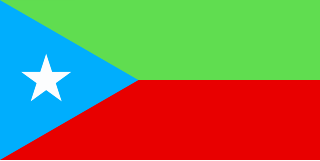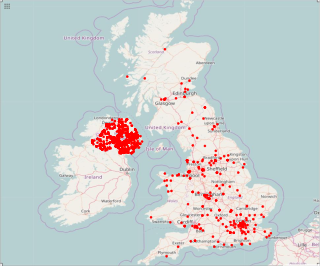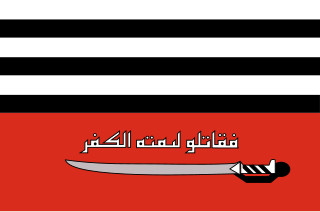Related Research Articles

Jaish-e-Mohammed is a Pakistan-based Deobandi Jihadist militant group active in Kashmir which is widely considered as a terrorist group. The group's primary motive is to separate Kashmir from India and merge it into Pakistan.

Tehreek-e-Jafaria was a Shia militant group in Pakistan, which was founded in 1979 by Arif Hussain Hussaini. Its creation coincided with the enforcement of controversial Islamic laws by then President of Pakistan, General Mohammad Zia-ul-Haq. At the same time, 1979 Iranian Revolution in Shi'a Iran added extra confidence and comfort in the movement.

The Insurgency in Balochistan is an insurgency or revolt by Baloch nationalists against the governments of Pakistan and Iran in the Balochistan region, which covers the Balochistan Province in southwestern Pakistan, Sistan and Baluchestan Province in southeastern Iran, and the Balochistan region of southern Afghanistan. Rich in natural resources like natural gas, oil, coal, copper, sulphur, fluoride and gold, this is the largest and least developed province in Pakistan. Armed groups demand greater control of the province's natural resources and political autonomy. Baloch separatists have attacked civilians from other ethnicities throughout the province. In the 2010s, attacks against the Shi'a community by sectarian groups—though not always directly related to the political struggle—have risen, contributing to tensions in Balochistan.

The Balochistan Liberation Army, also known as the Baloch Liberation Army, is a militant organization based in Afghanistan. The BLA became publicly known during the summer of 2000, after it claimed credit for a series of bombing attacks on Pakistani authorities. The BLA is listed as a terrorist organization by Pakistan, the United Kingdom and the United States.

Sindhudesh is an idea of a separate homeland for Sindhis proposed by Sindhi nationalist parties for the creation of a Sindhi state, which would be either autonomous within Pakistan or independent from it. The movement is based in the Sindh region of Pakistan and was conceived by the Sindhi political leader G. M. Syed after the independence of Bangladesh. He gave a new direction to Sindhi nationalism, founded the Jeay Sindh Tehreek in 1972 and presented the idea of Sindhudesh.

Sipah-e-Sahaba Pakistan, renamed to Millat-e-Islamia, is a Islamist organisation in Pakistan, which also functioned as a political party. It broke away from the main Deobandi Sunni organisation Jamiatul Ulema-e-Islam in 1985. Established in Jhang by Haq Nawaz Jhangvi, it was banned by President Pervez Musharraf in 2002 as a terrorist organization under the Anti-Terrorism Act of 1997. In March 2012, the government of Pakistan banned Sipah-e-Sahaba again. The government of the United Kingdom banned the group earlier in 2001.
The Baloch Students Organization is a student organisation that campaigns for the students of Pakistan's Balochistan Province. It was founded as a student movement on 26 November 1967 in Karachi and remains the largest ethnic Baloch student body in the country. It got divided due to ideological differences. BSO Pajjar and BSO Mengal are affiliated with the parliamentary framework of Pakistan. Dr Allah Nazar, founder of pro independence wing, in 2002 while he was studying in college, created a breakaway faction — BSO–Azad — that advocated struggle for an independent Balochistan based on pre-colonial Baloch country. The Pakistani government banned the BSO Azad on 15 March 2013, as a terrorist organisation.

Sipah-e-Muhammad Pakistan (S.M.P) was a Shia organisation and a former political party in Pakistan that was formed in 1993 and banned by President Pervez Musharraf on August 14, 2001 as a terrorist organisation.

Terrorism in the United Kingdom, according to the Home Office, poses a significant threat to the state. There have been various causes of terrorism in the UK. Before the 2000s, most attacks were linked to the Northern Ireland conflict. In the late 20th century there were also attacks by Islamic terrorist groups.

The Lashkar-e-Jhangvi or "Army of Jhangvi", is a Deobandi Sunni supremacist and jihadist militant organisation based in Afghanistan. The organisation operates in Pakistan and Afghanistan and is an offshoot of anti-Shia party Sipah-e-Sahaba Pakistan (SSP). The LeJ was founded by former SSP activists Riaz Basra, Malik Ishaq, Akram Lahori, and Ghulam Rasool Shah.
There are separatist movements in Pakistan which are based on ethnic and regional nationalism, including independence movements in Balawaristan, Sindh and Balochistan. The government of Pakistan has attempted to subdue these separatist movements.
Sindhi nationalism also known as Sindhi Nationalist Movement was launched in the 1972 to separate Sindh from Pakistan. After Bangladesh became independent in 1971, G.M. Syed gave a new direction to nationalism and founded the Jeay Sindh Mahaz in 1972 and presented the idea of Sindhudesh; a separate homeland for Sindhis. G.M. Syed is considered as the founder of modern Sindhi nationalism. However, Sindh nationalists stand divided.

Human rights violations in the province ofBalochistan refers to the human rights abuses that are occurring in the ongoing insurgency in Balochistan. The situation in has drawn concern in the international community, The human rights situation in Balochistan is credited to the long-running conflict between Baloch nationalists and Pakistani security forces.

Hyrbyair Marri is a Pakistani activist from the province of Balochistan. He is the fifth son of the Baloch nationalist leader Khair Bakhsh Marri. As of 2017, he resides in London, England.

The Sindhudesh Liberation Army is a Sindhi Militant organization based in the Sindh province of Pakistan. It became publicly known in 2010 after it claimed responsibility for a targeted bomb blast on railway tracks near Hyderabad, Pakistan. The group is currently active.

The Jeay Sindh Muttahida Mahaz is one of several major separatist political parties in Sindh, Pakistan, that advocate for the separation of Sindhudesh from Pakistan. Founded in the year 2000, by the veteran Sindhi nationalists belonging to the Sindhudesh movement who left JSQM. The founder and the current Chairman of party Shafi Muhammad Burfat is living in exile in Germany under political asylum.
On 16 February 2013, at least 91 people were killed and 190 injured after a bomb hidden in a water tank exploded at a market in Hazara Town on the outskirts of Quetta, the capital city of Balochistan, Pakistan. Most of the victims were members of the predominantly Shia Twelver ethnic Hazara community, and authorities expected the death toll to rise due to the large number of serious injuries. The Lashkar-e-Jhangvi group claimed responsibility for the blast, the second major attack against the Shia Hazaras in a month.
Tehreek-e-Azaadi Jammu and Kashmir abbreviated as TAJK is a terrorist front organisation, run by Hafiz Muhammad Saeed. By Indian government, It is claimed to be a front for Jamaat-ud-Dawa (JuD). In June 2017, it was banned by Pakistan after India raised the issue at the Financial Action Task Force (FATF), a global anti-financial terror body at Paris in February 2017. On 8 June 2017, TAJK was placed on the list of "proscribed organisations" by the National Counter Terrorism Authority (NCTA), an Internal Counterterrorism Authority of Pakistan under Interior Ministry.
The Pakistan Armed Forces have been criticized for eroding democratic processes in Pakistan, for being the largest business conglomeration in the country and for excessive control over the domestic and foreign policies of Pakistan. Critics of the Pakistan Army, such as human rights activist Manzoor Pashteen, have been jailed while like-minded Pakistani citizens are warned against criticizing the military establishment. In Pakistan, the military is considered a part of what is known as The Establishment; they control the state through a backdoor and are a part of a working deep state.
References
- ↑ "Proscribed Organizations List" (PDF). Retrieved 21 July 2022.